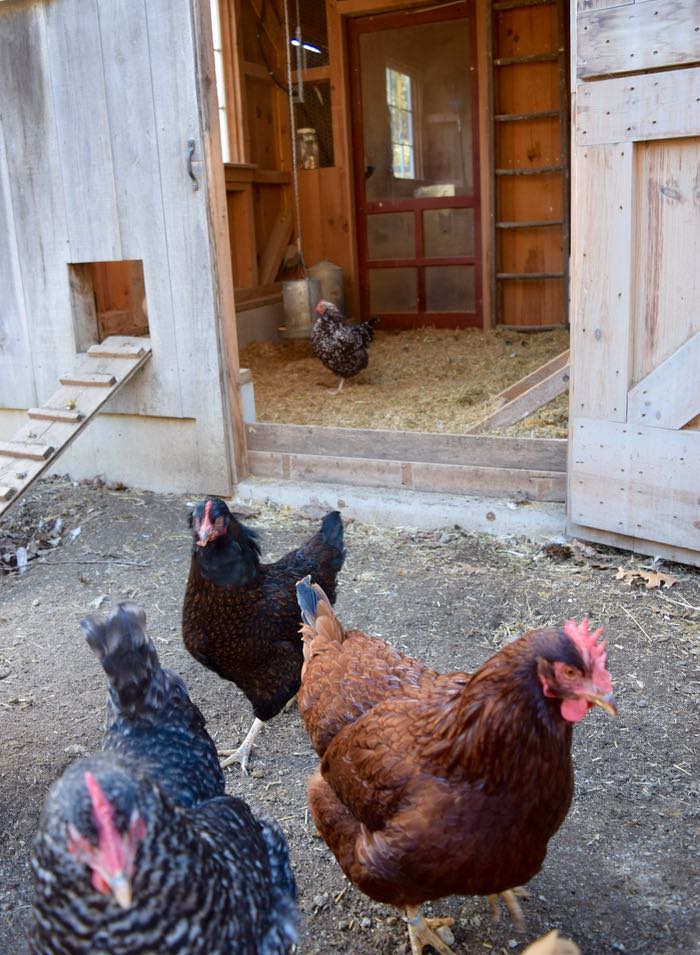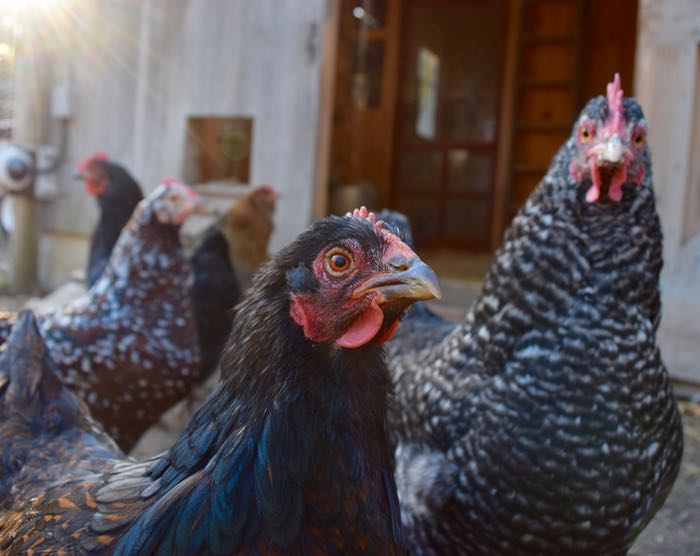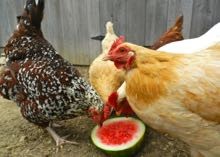The weather has been unseasonably warm. The air is damp from rain. You might think I’m happy that winter hasn’t hit yet, but I’m not. I worry about the animals. This is the time of year when respiratory disease decimates backyard flocks. To understand why, it helps to know a bit about bird anatomy. A chicken’s lungs are different from ours. Avian lungs are small and fixed to the rib cage. Air is pushed in and out not with a diaphragm, but with air sacs that act like bellows. (As an aside, this is one reason why fat hens, and those with tumors and ascites, die – their lungs can’t function when crowded and wet.) For an excellent explanation of a chicken’s respiratory system, read this piece put out by eXtension. To see an animation of how birds breathe, watch this. The entire film is fascinating, but start at 6:19 to learn about the avian lungs.
So, why do I think that early winter is a danger zone for your flock’s respiratory health? People tend to slack off on coop cleaning during the winter. It’s not fun when the mornings are frosty, and besides, the stuff doesn’t smell as bad in the cold. So manure gets left in the shavings, gets shred up by the hens’ big feet, and becomes dust that hangs in the air. In the winter, even early on when the days get above freezing, coops are closed up more tightly than the summer. Windows are shut. Ventilation is reduced. There are fewer hours of daylight so the flock stays indoors more, defecating, and breathing in air that’s filled with dust and damp particles. That’s enough to weaken a hen’s respiratory system. Add a few wayward germs and you have a recipe for a full-out disease outbreak in your flock.
I counter this by being hyper-conscientious about manure management. Each morning, when I let the Girls out, I take my fine-tined basket pitchfork and remove the piles from under the roosts. On a day like today, when there’s little wind, I open the barn. The big doors are left open all day.
Fresh air is the first line of defense against respiratory diseases. In the winter, it’s more important than ever.



Great post.
Too many flock owners try to seal up their flocks like sardines in a can.
Yes, and I hear from them after their hens get sick. Sunshine, exercise and fresh air are what all of my vintage farming books tout and it is still true today.
Birds and horses…two of the most fragile species. I agree with you that especially with birds, prevention is everything.
Thanks Terry for a very timely post as I have a question about the damp. Our sunshine this summer in UK has been very infrequent, in the last 3 months we have only had 4 slightly sunny days. The rest of the time it is either raining or overcast with drizzle. I have moved the Girls onto the other side of the garden which drains better but the ground is still very wet. They have some areas that are keep dry with covers so they can dust bath and get out of the rain to scratch around but its only dirt. They come down a ramp from their coop into a converted greenhouse in the morning before I let them out. These are fully cleaned everyday and keep dry, so I am not that concerned about damp air where they sleep. My concern is the lack of natural sunshine as this supplies the vitamin D needed to help absorb Calcium. Do I need to do anything about this ?? I know chickens originate from jungle fowl so back then would not have seen much sun, but on the odd day we have seen some this year the Girls have loved to bask in it and I feel they are missing out. Is there anything I can do to help, Thanks.
I wouldn’t worry about the sunlight as long as they’re getting their free-range time.
As usual Terry, a very good, informative post in deed. Really enjoyed reading it as I like to try to learn as much as possible about chickens. I really think it helps to understand the chicken’s anatomy. Jan’s right in saying here in the UK we are not getting much sunshine at all. I think our English chickens are probably used to it this time of year. I give my chickens cod liver oil (a bit on piece of bread a couple of times a week) as I believe this to help with absorbsion of calcium as it contains vitamin D. I think that this does them good (doesn’t seem to do any harm anyway as long as you do not overdo it). Might be worth a try Jan! Thanks again, Terry for your invaluable information. Kind regards.
Careful not to overdo the cod liver oil. Some brands are high in heavy metals (here’s an article about that – older info but still a problem. http://www.naturalnews.com/001021_nutritional_supplements_healthy_oils.html)
Also, it is a fat, and it’s not good for hens to consume too much.
Thanks, I won’t worry as much. They free range all day, plenty of places to hide.The dirt area’s are what is covered, they also have a very large area of grass and my veggie patch’s to scratch round in if they want to. It was just the sunshine I was concerned about..:)
Thanks Louise, but I have also have reservations on the use of Cod Liver Oil after reading about it..:)
Off topic, but haven’t seen Phoebe for a day or two, is she okay?
She’s fine and as active as ever. I put the last of the pumpkin around the corner in the compost area, and she’s been hanging out there – I thought that she was done with it, but I guess not.
I see Phoebe in the corner, just now :) Thanks